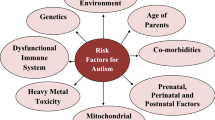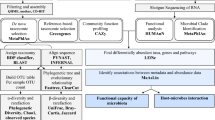Abstract
In humans, altered microbial composition of the gut has been reported in different disorders, including children with autism. A number of studies comparing gut microbiota of autistic spectrum disorder patients and typically developed individuals revealed higher amount (albeit with some contradictions) of different bacteria—Bacteroidetes, Firmicutes, Proteobacteria and Tenericutes in autistic individuals. In this study differences in gut microbiota composition between children with atypical autism and childhood autism were identified. Significant differences in-between gut microbiomes in children belonging to these two groups at genus and species levels were identified.



Similar content being viewed by others
REFERENCES
Strati, F., Cavalieri, D., Albanese, D., De Felice, C., Donati, C., Hayek, J., Jousson, O., Leoncini, S., Renzi, D., Calabrò, A., and De Filippo, C., New evidences on the altered gut microbiota in autism spectrum disorders, Microbiome, 2017, vol. 5, p. 24. https://doi.org/10.1186/s40168-017-0242-1
Anxiety disorders, in Diagnostic and Statistical Manual of Mental Disorders, American Psychiatric Association, 2013. https://doi.org/10.1176/appi.books.9780890425596.dsm05
World Health Organization, ICD-10: International Statistical Classification of Diseases and Related Health Problems, World Health Organization, 2004.
Masi, A., DeMayo, M.M., Glozier, N., and Guastella, A.J., An overview of autism spectrum disorder, heterogeneity and treatment options, Neurosci. Bull., 2017, vol. 33, pp. 183–193. https://doi.org/10.1007/s12264-017-0100-y
Lyall, K., Croen, L., Daniels, J., Fallin, M.D., Ladd-Acosta, C., Lee, B.K., Park, B.Y., Snyder, N.W., Schendel, D., Volk, H., et al., The changing epidemiology of autism spectrum disorders, Annu. Rev. Public Health, 2017, vol. 38, pp. 81–102. https://doi.org/10.1146/annurev-publhealth-031816-044318
Walker, W.A., The importance of appropriate initial bacterial colonization of the intestine in newborn, child, and adult health, Pediatr. Res., 2017, vol. 82, pp. 387–395. https://doi.org/10.1038/pr.2017.111
Mulle, J.G., Sharp, W.G., and Cubells, J.F., The gut microbiome: a new frontier in autism research, Curr. Psychiatry Rep., 2013, vol. 15, p. 337. https://doi.org/10.1007/s11920-012-0337-0
Bezawada, N., Phang, T.H., Georgina, L., Hold, G.L., and Hansen, R., Autism spectrum disorder and the gut microbiota in children: a systematic review, Ann. Nutr. Metab., 2020, vol. 76, pp. 16–29. https://doi.org/10.1159/000505363
Hsiao, E.Y., McBride, S.W., Hsien, S., Sharon, G., Hyde, E.R., McCue, T., Codelli, J.A., Chow, J., Reisman, S.E., Petrosino, J.F., et al., Microbiota modulate behavioral and physiological abnormalities associated with neurodevelopmental disorders, Cell, 2013, vol. 155, pp. 1451–1463. https://doi.org/10.1016/j.cell.2013.11.024
Carabotti, M., Scirocco, A., Maselli, M.A., and Severi, C., The gut-brain axis: interactions between enteric microbiota, central and enteric nervous systems, Ann. Gastroenterol., 2015, vol. 28, pp. 203–209.
Shaw, W., Kassen, E., and Chaves, E., Increased urinary excretion of analogs of Krebs cycle metabolites and arabinose in two brothers with autistic features, Clin. Chem., 1995, vol. 41, pp. 1094–1104. https://doi.org/10.1093/clinchem/41.8.1094
Nicholson, J.K., Holmes, E., Kinross, J., Burcelin, R., Gibson, G., Jia, W., and Pettersson, S., Host-gut microbiota metabolic interactions, Science, 2012, vol. 336, pp. 1262–1267. https://doi.org/10.1126/science.1223813
Baron-Cohen, S., Allen, J., and Gillberg, C., Can autism be detected at 18 months? The needle, the haystack, and the CHAT, Br. J. Psychiatry, 1992, vol. 161, pp. 839–843. https://doi.org/10.1192/bjp.161.6.839
Baron-Cohen, S., Hoekstra, R., Knickmeyer, R., and Wheelwright, S., The Autism-Spectrum Quotient (AQ)— Adolescent version, J. Autism Dev. Disord., 2006, vol. 36, pp. 343–350. https://doi.org/10.1007/s10803-006-0073-6
Williams, J., Allison, C., Scott, F., Stott, C., Bolton, P., Baron-Cohen, S., and Brayne, C., The Childhood Asperger Syndrome Test (CAST): test-retest reliability, Autism, 2006, vol. 10, no. 4, pp. 415–427. https://doi.org/10.1177/1362361306066612
Lord, C., Rutter, M., DiLavore, P.C., Risi, S., Gotham, K., and Bishop, S., Autism Diagnostic Observation Schedule, Second Edition (ADOS-2) Manual (Part I): Modules 1–4, Torrance, CA: Western Psychological Services, 2012.
Bandini, L.G., Anderson, S.E., Curtin, C., Cermak, S., Evans, E.W., Scampini, R., Maslin, M., and Must, A., Food selectivity in children with autism spectrum disorders and typically developing children, J. Pediatr., 2010, vol. 157, pp. 259–264. https://doi.org/10.1016/j.jpeds.2010.02.013
Iglesias-Vázquez, L., Van Ginkel Riba, G., Arija, V., and Canals, J., Composition of gut microbiota in children with autism spectrum disorder: a systematic review and meta-analysis, Nutrients, 2020, vol. 12, p. 792. https://doi.org/10.3390/nu12030792
Vesth, T., Ozen, A., Andersen, S.C., Kaas, R.S., Lukjancenko, O., Bohlin, J., Nookaew, I., Wassenaar, T.M., and Ussery, D.W., Veillonella, Firmicutes: Microbes disguised as Gram negatives, Stand. Genomic Sci., 2013, vol. 9, pp. 431–448. https://doi.org/10.4056/sigs.2981345
Tomova, A., Husarova, V., Lakatosova, S., Bakos, J., Vlkova, B., Babinska, K., and Ostatnikova, D., Gastrointestinal microbiota in children with autism in Slovakia, Physiol. Behav., 2015, vol. 138, pp. 179–187. https://doi.org/10.1016/j.physbeh.2014.10.033
Coretti, L., Paparo, L., Riccio, M.P., Amato, F., Cuomo, M., Natale, A., Borrelli, L., Corrado, G., De Caro, C., Comegna, M., et al., Gut microbiota features in young children with autism spectrum disorders, Front. Microbiol., 2018, vol. 9, p. 3146. https://doi.org/10.3389/fmicb.2018.03146
Mangiola, F., Ianiro, G., Franceschi, F., Fagiuoli, S., Gasbarrini, G., and Gasbarrini, A., Gut microbiota in autism and mood disorders, World J. Gastroenterol., 2016, vol. 22, pp. 361–368. https://doi.org/10.3748/wjg.v22.i1.361
Laue, H.E., Korrick, S.A., Baker, E.R., Karagas, M.R., and Madan, J.C., Prospective associations of the infant gut microbiome and microbial function with social behaviors related to autism at age 3 years, Sci. Rep., 2020, vol. 10, p.15515. https://doi.org/10.1038/s41598-020-72386-9
Kang, D.-W., Ilhan, Z.E., Isern, N.G., Hoyt, D.W., Howsmond, D.P., Shafferf, M., Lozupone, C.A., Hahn, J., Adams, J.B., and Krajmalnik-Brown, R., Differences in fecal microbial metabolites and microbiota of children with autism spectrum disorders, Anaerobe, 2018, vol. 49, pp. 121–131. https://doi.org/10.1016/j.anaerobe.2017.12.007
Kang, D.-W., Park, J.G., Ilhan, Z.E., Wallstrom, G., LaBaer, J., Adams, J.B., et al., Reduced incidence of Prevotella and other fermenters in intestinal microflora of autistic children, PLoS One, 2013, vol. 8, p. e68322. https://doi.org/10.1371/journal.pone.0068322
Berding, K. and Donovan, S.M., Diet can impact microbiota composition in children with autism spectrum disorder, Front. Neurosci., 2018, vol. 12, p. 515. https://doi.org/10.3389/fnins.2018.00515
Parker, B.J., Wearsch, P.A., Veloo, A.C.M., and Rodriguez-Palacios, A., The genus Alistipes: gut bacteria with emerging implications to inflammation, cancer, and mental health, Front. Immunol., 2020, vol. 11, p. 906. https://doi.org/10.3389/fimmu.2020.00906
Thomas, F., Hehemann, J.H., Rebuffet, E., Czjzek, M., and Michel, G., Environmental and gut bacteroidetes: the food connection, Front. Microbiol., 2011, vol. 30, p. 93. https://doi.org/10.3389/fmicb.2011.00093
Rinninella, E., Raoul, P., Cintoni, M., Franceschi, F., Miggiano, G.A.D., Gasbarrini, A., and Mele, M.C., What is the healthy gut microbiota composition? A changing ecosystem across age, environment, diet, and diseases, Microorganisms, 2019, vol. 7, p. 14. https://doi.org/10.3390/microorganisms7010014
Vendrik, K.E.W., Ooijevaar, R.E., de Jong, P.R.C., Laman, J.D., van Oosten, B.W., van Hilten, J.J., et al., Fecal microbiota transplantation in neurological disorders, Front. Cell Infect. Microbiol., 2020, vol. 10, p. 28. https://doi.org/10.3389/fcimb.2020.00098
Funding
This work was supported by Latvian Science Council grant no. lzp-2018/2-0343 “Biomarkers of altered gut microbiome in children with autism spectra disorders.”
Author information
Authors and Affiliations
Corresponding authors
Ethics declarations
Conflict of interests. The authors declare that they have no conflicts of interest.
Statement on the welfare of humans. Central Medical Ethics Committee at the Ministry of Health, Republic of Latvia approved the study (no. 1/19-02-12 from February 12th, 2019). Parents of all involved subjects signed informed consent form and filled-in questionaries before collecting samples. The study was performed in accordance with the ethical standards as laid down in the 1964 Declaration of Helsinki and its later amendments.
About this article
Cite this article
Nakazawa-Miklasevica, M., Daneberga, Z., Murmane, D. et al. Alterations of Gut Microbiota among Children with Autism Spectrum Disorder. Mol. Genet. Microbiol. Virol. 36 (Suppl 1), S29–S36 (2021). https://doi.org/10.3103/S0891416821050104
Received:
Revised:
Accepted:
Published:
Issue Date:
DOI: https://doi.org/10.3103/S0891416821050104




